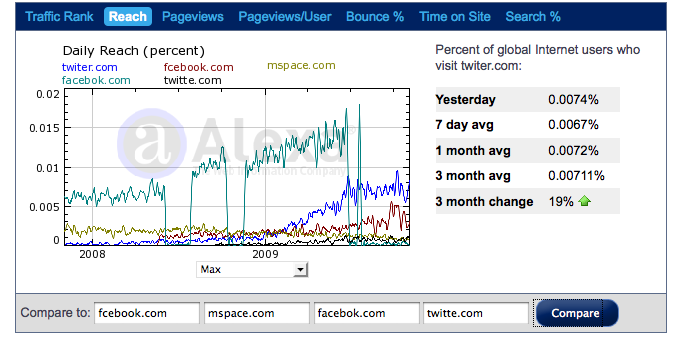Facebook has over 400 million active users and members spend over 951 man-years on the site each month. Facebook is passing Google this year as the most visited site in the US and is going to earn somewhere between $710M and $1.1B in revenue this year.
Google on the other hand have a $27B revenue run rate for 2010 [based on Q1 2010 earnings]. With similar on-site traffic they are doing 25 times Facebook’s revenue. Google have had a long time to learn about printing money efficiently, but even so that’s a blush-worthy statistic for the Facebook executive team. So why the difference in performance?
Facebook has a crisis of intent. When a visitor signs in to Facebook their intent is to socialize. They don’t want to buy anything and they certainly don’t want to click on ads that lead them to buying something. Facebook has the best data on the web about the people using their service. But all that wonderful data is useless without intent.
When a visitor hits Google their intent is to see something, learn something, do something etc and these can be cajoled into buying decisions. If Google guides the user to the right vendor, they make a vendor money and can share in some of the revenue. Google’s data on each visitor pales in comparison to Facebook. But Google catches each visitor at the moment they have intent. And that is the power of the search business.
Facebook needs to solve their crisis of intent. Intent is the missing ingredient that stands between Facebook and $27 Billion in revenue multiplied by the social graph and profile data that Google doesn’t have.
Changing Facebook.com to capture visitor attention when they have buying intent risks destroying a valuable asset. So instead Facebook have decided to take their data to the places where visitors have intent: The rest of the web.
“If intent won’t come to Facebook, we’ll take Facebook to intent.” ~Mark Zuckerburg [may have said this]
In the next 3 to 12 months Facebook are going to roll out their own ad network for publishers – a direct competitor to Google AdSense.
If Facebook can use my interests, sex, age, location, who I’m friends with and their age, location, interests etc. to infer that when I’m searching for a ‘bobbin’ it’s probably because I want to tie steelhead flies with it, then it makes more sense for every publisher on the web to use Facebook’s ad network than Google or anyone else because they will simply make more money.
Facebook’s Ad Network will make publishers more money and increase engagement.
Facebook Connect was phase 1: “Lets see if a distributed Facebook gets traction and doesn’t raise privacy flags.” It was a resounding success.
The Social Web and Open Graph is phase 2: “Lets see if we can share some user data using an opt-out model.” From the Facebook blog: “For example, now if you’re logged into Facebook and go to Pandora for the first time, it can immediately start playing songs from bands you’ve liked across the web.”
There have been the usual privacy rumblings, but so far the Facebook community seems to be OK with an opt-out model of distributed data sharing.
The significance of this is staggering: Facebook have positioned themselves for the perfect AdSense kill-shot. 6 to 12 months from now publishers will be able to integrate Facebook’s applications and ad network on their blog or website and get:
- Better revenue than Google AdSense or any other ad network due to better targeting
- Increased user engagement through social features
- Increased virality through recruiting other Facebook members
- Increased data on each visitor from their very first pageview reducing bounce.
Advertisers will get:
- Less click fraud because you’re no longer just an IP address and a cookie.
- Better targeting including the holy grail of demographics: Age, Sex, Location.
- Ability to show your ad at the moment a user has buying intent on a search engine, a blog about visiting Egypt, etc.
A significant portion of Google’s $27 Billion in revenue this year will come from their publisher ad network. Google knows what’s at stake. That is why they are willing to bet GMail on products like Google Buzz.
Facebook is the most serious threat to Google’s business that they have faced. If Facebook plays this perfectly, they will kill the bear and 5 to 10 years from now will be the largest and most profitable ad network on Earth.
Anyone who plans to compete with them will have to do better than textual ad targeting.
